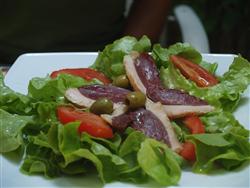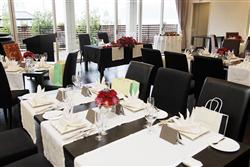
Learn about the Accommodation, Food Service and Hospitality
Everyone who leaves home is a potential customer for the hospitality industry, whether for an hour a day, or longer. That fact makes almost everyone, everywhere, a hospitality industry client (and that's a lot of potential customers).
If you want to be successful in hospitality, you need to understand the services that can be provided; how to provide them, and how to attract and sell a potential client, so they choose your offerings above others.
Course Content and Structure
To obtain this certificate, you need to complete a total of six modules, spread over 600 hours of study. Three of the modules are compulsory core studies; and the other three are chosen from a range of electives
Core Modules are:

Elective Modules can be chosen from any of the following:
Core Module Outlines
Food and Beverage Management BTR102
This module has nine lessons as follows:
- Human Nutrition
- Cooking
- Kitchen & Food Management
- Planning A Menu
- Alcoholic Beverages
- Tea, Coffee and Non-Alcoholic Beverages
- Scope and Nature Of Catering Services
- Personnel Management
- Management Of Catering Services
Click here for more information
Event Management BRE209
This has 9 lessons as outlined below:
- Scope and Nature of Event Management
- Developing the Concept
- Physical an Human Resources
- Project Logistics
- Marketing an Event
- Financial Management
- Risk Management
- Staging the Event
- After the Event
Click here for more information
Hotel Management BTR202
This module has nine lessons as follows:
- Introduction: Scope and Nature of Hotel Management
- Organisation of the Hotel Workplace
- Staff Management in Hotels
- Control Systems
- Front Desk Management (Reception)
- Servicing Rooms and General Cleaning
- Building and Facility Maintenance
- Activities Management
- Food Service
Click here for more information
Elective Modules -
Food Preparation BRE212
- Introduction
- Fruit and vegetables
- Cereals & Starches; Bread, cereals and potatoes
- Meat Fish and Alternatives
- Milk and dairy
- Fats and Sugars
- Flavouring Food
- Menu planning on a Small Scale
- Menu Planning on a Large Scale
Bed and Breakfast Management BTR203
This subject has seven lessons:
- Introduction to Management & Marketing
- Facilities and Decor
- Customer Service
- Equipment
- Supplying Meals
- Food Purchasing
- Records and Financial Management
Bar Service VTR204
- Introduction
- Alcoholic Products
- Non-Alcoholic Beverages
- Service Procedures
- Mixing Drinks
- Wine
- Bar Service and Problem Based Learning Project – In this lesson, students are required to carry out a project to develop a new and innovative bar service.
Wedding Planning BTR104
 There are 9 lessons in this course:
There are 9 lessons in this course:
- Introduction: the nature, scope
- Planning
- Managing People
- Managing Locations
- Managing the Program
- Other Issues
- Managing the Client
- Managing the Wedding Day
- Operating a Wedding Business
Starting A Small Business VBS101
The course covers all the basics to plan a business and start its first steps. It contains and explain what are the elements associated with profitability and business success.
- Introduction to Small Business
- The Business World
- Your alternatives - different types of ventures
- Marketing
- Planning
- Basic Bookkeeping
- Sales Methods
- Budgeting
- Developing a 12 month business plan
- Implementing a business plan
- Reviewing progress in a new business
- Improving profitability
 Human Nutrition 1 BRE102
Human Nutrition 1 BRE102
The nine lessons are as follows:
- Introduction to Nutrition
- The Digestive System
- Absorption & Enzymes
- Energy Value and Foods
- Carbohydrates and Fats
- Proteins
- Vitamins and Minerals
- Water
- Nutrient Disorders
Human Nutrition II BRE202,
There are eight lessons in this course, each requiring about 12 hours work by the student. Emphasis is placed on understanding the body, the food we eat & it's affects, our mental, emotional health (state of mind), and physical health.
The content of each of the eight lessons is as outlined below:-
- Cooking And Its Affect On Nutrition
- Food Processing And Its Affect On Nutrition
- Recommended Daily Intake Of Nutrients
- Vitamins
- Minerals
- Planning A Balanced Diet
- Assessing Nutritional Status And Needs
- Timing Of Meals, And Needs For Special Groups
Bush Tucker Plants BHT328
There are 8 lessons in this course:
-
Introduction
-
Growing
-
Gathering
-
Nuts and Seeds
-
Vegetables
-
Fruits
-
Flavourings, Teas, Essences
-
Using Bush Tucker Plants
Industry Project BIP000 -This can be either work experience or some other form of learning which involves intimate contact with the industry.
Find out More On Industry Projects
LEARN ABOUT THE FOOD SERVICE INDUSTRY
If you want to work in the food industry, you need to understand the scope of foods you might be dealing with. Along with meats, fish, vegetables, baked goods and other solid foods, there can also be a very wide range of beverages which you may need to become familiar with.
When we talk about beverages we are referring to any drink except for water...orange juice, tea, milk, and so forth. But for our purposes we are only interested in drinks which are made from plant parts, or extracts from plant parts. This still leaves us with a vast range of drinks. So, for the purpose of this presentation, I'll place plant-derived beverages into specific groups.
One of the most useful, and widely accepted, ways of classifying beverages is to firstly split them into alcoholic and non-alcoholic drinks.
Alcoholic Beverages
Alcoholic beverages are either derived from fruits or sap, or they are derived from grains - predominantly cereal grains such as wheat, rye and rice. In either case, the plant parts may be distilled to produce the beverage, which is how those drinks we refer to as spirits (and the Americans call liquor) are made, or they are fermented and not distilled as is the case with wine and beer.
Non-Alcoholic Beverages
Non-alcoholic beverages include tea, coffee, and cacao, as well as a range of fruit drinks, juices and fizzy drinks. These can be divided into carbonated and non-carbonated drinks.
 What about Your Future?
What about Your Future?This course will help you develop not only knowledge and skills; but a real awareness of the hospitality industry and the many opportunities it can offer you. Sometimes a student will already be working when they commence this course; or may enter employment while they are studying. For others; you may study; complete the course, and then consider making a move to working in the hospitality industry.
There are many options as your career develops. Some of you may start your own business, perhaps as a caterer, running a guesthouse or a cafe; and others may choose to find work for someone else.
What's involved in Catering? (an example)
Catering is a very competitive industry, and it can be a challenge to balance customer needs, budgets, and still maintain competitive offers.
Caterers can at times work long and unsociable hours, sometimes catering for more than one event in a day. Caterers will often be required to work evenings, public holidays, and weekends.
Catering can be physically demanding, standing for long periods of time, setting up equipment, loading and unloading equipment, carrying heavy food platters, and working long hours.
There can be a significant amount of pressure to ensure the food is prepared in a timely manner and presented well. Mishaps can produce high levels of stress, for example burning the food, a late delivery of produce, dropping a plate of food, etc.
 How to become a Caterer
How to become a Caterer
There are many different ways to become a caterer. Many people will start as wait staff then work their way up. Others may come from an event management background. Others will train as chefs then move into catering.
There is no one route to becoming a successful caterer, and ultimately it will come down to developing a certain set of skills, which will probably come through work experience, personal experience, and training of some sort (cooking, business, hospitality, event management etc).
Some of the skills you will need include:
- Leadership skills – depending on your role, most caterers are responsible for running a smooth event. You will need to be confident, and able to use your initiative to solve problems, and have good communication skills to ensure your team gets the job done in a manner that keeps the client happy.
- Time Management – it is crucial that everything is ready for the event you are catering for. It can’t be 10 minutes late, let alone a day late.
- Culinary and creative ability – You will need to be able to develop innovative and appealing menus that please the client, as well as having the ability to produce the food.
- Customer service – this is an important part of a catering role. You will need to be able to give great customer service to your client in the preparation of the event, and excellent customer service to their guests during the event. Having good interpersonal skills will also help you to network and gain new clients.
- Business skills – you will need to have good business skills to effectively manage your business. These skills range form administrative tasks to marketing skills, to financial management skills.
WHAT NEXT?
Register to Study - Go to “It’s Easy to Enrol” box at the top of the page and you can enrol now.
or
Get Advice – Email us at info@acsedu.co.uk OR
Use our FREE COUNSELLING SERVICE to contact a tutor
CLICK TO CONTACT US